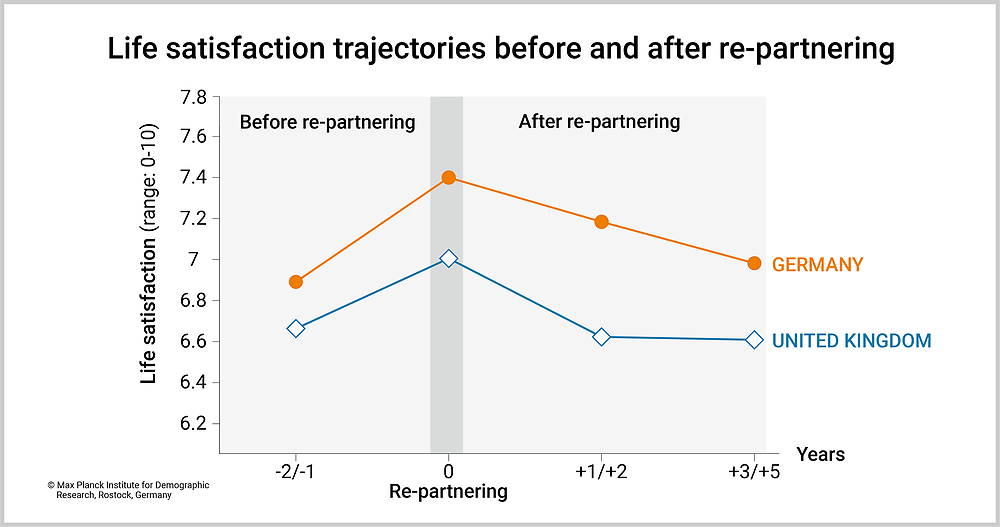September 12, 2024 | News | Latest Publications
Summer 2024
Find out what new publications have been released in July, August and September 2024.
All publications of MPIDR
Google searches as a way to predict migration movements
Paper published September 10, 2024

© iStockphoto.com / LICreate
In a recently published study, Ebru Sanliturk (Max Planck Institute for Demographic Research) and Francesco C. Billari (Bocconi University) examined whether Google searches can serve as good predictors for estimating refugee populations, especially when traditional data are unavailable. The researchers analysed searches for the names of Turkish provinces exploiting the alphabetical difference between Turkish and Arabic and found a positive and significant correlation between searches and the number of Syrian citizens under temporary protection in all provinces from January 2016 to December 2019.
The study shows that Google searches can be a reliable way to predict short-term changes in migrant population patterns. In particular, Google searches can be a valuable tool for predicting migration patterns to which traditional socio-economic indicators are less sensitive due to their shorter reference periods.
Original Publication
Ebru Sanliturk and Francesco C. Billari: Search for a New Home: Refugee Stock and Google Search in International Migration Review (2024), DOI: 10.1177/019791832412754
Keywords
Syrian refugees, digital trace data, migrant stocks, forced displacement
The brain/nervous system never stops learning
Paper published August 9, 2024
An analysis of publications reveals the evolution of the concept of plasticity in neuroscience

© istockphoto.com / peepo
Aliakbar Akbaritabar and Beatrix P. Rubin used quantitative bibliometric methods in combination with qualitative methods to examine the use and evolution of the concept of plasticity in the neuroscience literature from the late 20th century to the present. Throughout this period, synaptic plasticity remained dominant. This means that the nervous system changes and adapts to different demands.
They found that new concepts of plasticity have been introduced, reflecting scientific advances in understanding the dynamic nature of the nervous system. This research facilitates a shift from the view that the adult nervous system is immutable to an understanding of the nervous system as capable of lifelong change and adaptation.
Original Publication
Aliakbar Akbaritabar and Beatrix P. Rubin: The evolution of plasticity in the neuroscientific literature during the second half of the twentieth century to the present in Journal of the History of the Neurosciences (2024), DOI: 10.1080/0964704X.2024.2371783
Keywords
Anchor concept, bibliometric data, concept in flux, plasticity, pubmed, scientific concepts, Web of Science (WOS)
Less smoking and better education: Improving U.S. Mortality Trends
Paper published August 1, 2024
Study highlights role of social and behavioral factors

© iStockphoto.com / Suriyawut Suriya
A recent study found that behavioral changes, such as a decline in smoking, and social progress, including an expansion of education, have contributed to recent improvements in U.S. mortality. Together, these two factors accounted for 65% of the improvements in mortality. The researchers also identified an increase in psychological distress as a contributing factor to the slowing of mortality improvement in the U.S. during the study period, but most of the slowing remains unexplained.
Original Publication
Samuel Preston, Yana Vierboom, Mikko Myrskylä: Socio-behavioral factors contributing to recent mortality trends in the United States in Demographic Research (2024); DOI 10.4054/DemRes.2024.51.7
Keywords
despair, health, mortality, National Health Interview Survey (NHIS), smoking, trends
"Pandemic Babies: The Covid-19 Pandemic and its Impact on Fertility and Family Dynamics" published
Special issue of Population and Development Review (July 2024)
In 2021, in the midst of the pandemic, a team from the Max Planck Institute for Demographic Research (MPIDR) organized a conference on "Pandemic Babies? The Covid-19 pandemic and its impact on fertility and family dynamics". At that time, it was already clear that the Covid-19 pandemic would have a global impact on childbearing and family processes. Early studies showed changes in couples' fertility plans, documented changes in the division of household labor, or predicted fertility declines in high-income countries based on now-casting methods. However, the impact of the pandemic on fertility, partnerships, and family dynamics evolved rapidly and remained the subject of much speculation.
The conference brought together more than 100 international researchers to discuss their research on the impact and consequences of the pandemic on families and fertility.
The special issue of Population and Development Review, "Pandemic Babies: The Covid-19 Pandemic and Its Impact on Fertility and Family Dynamics" has now been published. The special issue was co-funded by the Max Planck Institute for Demographic Research and the Population Council and is based on the results of the 2021 conference. All papers are open access.
Special Issue
Population and Development Review: Volume 50, Issue S1
Pandemic Babies: The Covid‐19 Pandemic and Its Impact on Fertility and Family Dynamics Pages: 1-446 July 2024
Issue Edited by: Natalie Nitsche, Joshua Wilde, Mikko Myrskylä
Beyond Casualties
Paper published July 26, 2024
The Enduring Trauma of Bereavement After Armed Conflicts

© Meysam Azarneshin – stock.adobe.com
Each year, hundreds of thousands of people are affected by armed conflict, both directly, through loss of life, or indirectly, through the loss of family members. Researchers from the Max Planck Institute for Demographic Research (MPIDR), CED – Centre d’Estudies Demogràfics and the University of Washington studied the extent and duration of bereavement among those who lost immediate family members in high-intensity conflicts. Their finding reveals that for every casualty, multiple loved ones carry the trauma for the rest of their lives. In Syria, for example, each death leaves an average of four relatives - parents and/or children - devastated. Bereavement can persist for decades, hindering reconciliation and potentially escalate future levels of violence. This study underscores the need for timely and effective conflict resolution and dedicated support for mourners.
Read the full press release here.
Original Publication
Diego Alburez-Gutierrez, Enrique Acosta, Emilio Zagheni, Nathalie E. Williams: The long-lasting effect of armed conflicts deaths on the living: Quantifying family bereavement in Science Advances (2024). DOI: 10.1126/sciadv.ado6951
Keywords
Armed conflict, kinship, mortality, bereavement, peace
Pandemic Childcare Burden on Mothers
Paper published July 18, 2024
Study Reveals Increased Mental Health Strain

© iStockphoto.com / Portra
During the Covid-19 pandemic, parents suddenly had to cope without formal childcare, placing a significant strain on mothers in particular. A recent study from the Max Planck Institute for Demographic Research (MPIDR) examines the changes in childcare arrangements during the pandemic and how this impacted parents' mental health. Mothers who continued to be primarily responsible for childcare experienced increased stress and exhaustion during the pandemic. Fathers, on the other hand, benefited in terms of health when their partner continued to provide the majority of childcare duties. ... more
Original Publication
Nicole Hiekel, Mine Kühn: Lessons from the pandemic: Gender inequality in childcare and the emergence of a gender mental health gap among parents in Germany in Demographic Research (2024); DOI: 10.4054/DemRes.2024.51.3
Keywords
COVID-19, division of childcare, exhaustion, gender role attitudes, loneliness, mental health, pandemic, stress
Social Stratification in Science
Paper published July 14, 2024
Study finds a small group of scientists dominate the success in science

© iStockphoto.com / photoman
This recent study by Aliakbar Akbaritabar, Andres F. Castro Torres, and Vincent Larivière reveals a stark divide among scientists worldwide. Research production and the benefits of collaboration within the scientific community appear to be disproportionately concentrated among a small elite group. The researchers analyzed the careers of 8.2 million scientists using 12 measures of productivity, geographical mobility, and collaboration. The study found that a small top class of scientists accounted for a large share of scientific output, while a large middle and bottom class struggled to keep up.
The study's findings suggest that the top class succeeds by collaborating with scientists from other classes and age groups, but benefits disproportionately from these collaborations. This has implications for ongoing stratification in academia, where a small group of scientists may continue to dominate the success in science. Akbaritabar et al. hope their findings will help start a conversation about how to address inequality in the scientific community.
Read more in this news coverage
Original Publication
Aliakbar Akbaritabar, Andrés Felipe Castro Torres Vincent Larivière: A global perspective on social stratification in science in Humanities and Social Sciences Communications (2024), DOI: 10.1057/s41599-024-03402-w
Keywords
Scientific Stratification, Collaboration Networks, Mobility, Academia, Research Impact
Robust improvements in cognitive health in European countries, but not in the United States
Paper published July 2, 2024
Development of memory performance in several countries compared - US weakest

© iStockphoto.com / LightFieldStudios
Cognitive impairment is a major concern for the aging population, with more than 55 million people worldwide suffering from dementia, a number expected to triple by 2050. A recent study found that compared to the United States, most European countries have shown significant improvements in average memory function among adults aged 50 and older over the past two decades. The study's findings highlight the need for further research and public health efforts to understand the reasons for cross-national differences in cognitive health trends, particularly the relatively stagnant trend in the United States. ... More
Original Publication
Mikko Myrskylä, Jo Mhairi Hale, Daniel C Schneider, Neil K Mehta: Trends in memory function and memory impairment among older adults in the USA and Europe, 1996-2018 in The Journals of Gerontology: Series A, glae154(2024); DOI: 10.1093/gerona/glae154
Keywords:
Memory impairment, dementia, trends, comparative analysis
Parliamentary Members use Simpler Language on hot Days
Paper published June 21, 2024

© iStockphoto.com / webphotographeer
Climate change has many widespread and complicated effects on the well-being of people and the planet, and a new study in iScience on June 13 has now added a surprising one to the list. After analyzing the language used in seven million parliamentary speeches around the world, it shows that high temperatures lead to a significant and immediate reduction in politicians’ language complexity.
You can read the full news story here.
Original Publication
Keivabu, Risto Conte, Widmann, Tobias “The effect of temperature on language complexity: Evidence from seven million parliamentary speeches” in iScience (2024), DOI: 10.1016/j.isci.2024.110106
Keywords
heat, politics, speech, temperature, climate, hot, complexity, parlamentarian, speech complexity
Happy and Healthy Within the Family Structure
Paper published June 14, 2024
Our well-being partly depends on the family constellations we are embedded in. The intergenerational position is particularly decisive, a new study says.
Original Publication
Bettina Hünteler, Karsten Hank: Life-course generational placements and health and wellbeing in later life in Ageing and Society (2023) DOI: 10.1017/S0144686X2300034X
This article was first published on June 26, 2024, in the newsletter Demografische Forschung aus Erster Hand.
Sharing is Caring
Paper published June 7, 2024
Open Science in Demographic Research

© MPIDR
Open Science addresses concerns about the reliability of scientific research and is gaining traction in various fields. Ugofilippo Basellini's paper reviews the state of openness in demographic research and finds significant progress in open access, but less so in the availability of open software code. The study emphasizes the importance of sharing software code to advance the field and proposes recommendations to encourage this practice. Basellini advocates for a culture of openness, emphasizing the need for supportive feedback, incentives, and training to encourage code sharing.
Read and see more in this news article.
Original Publication
Basellini, Ugofilippo: "Open science practices in demographic research: an appraisal" in Demographic Research (2024).
DOI: 10.4054/DemRes.2024.50.43
Keywords
demography, open access data, population studies, replicability, reproducibility, open science
New Partnerships Improve Life Satisfaction for Single Mothers
Paper published June 6, 2024

© MPIDR
Single mothers often experience poorer mental health and lower life satisfaction due to increased stress, financial insecurity, and less support in everyday life. A study by the Max Planck Institute for Demographic Research and Tilburg University reveals that new partnerships can improve the life satisfaction of single mothers, especially through increased financial resources. Long-term partnerships increase satisfaction compared to more frequent partner changes, and despite financial advantages, a new partner does not usually bring relief around household chores to the household.
Read the full press release here
Original Publication
Philipp Dierker, Mine Kühn, Mikko Myrskylä: Re-partnering and single mothers' mental health and life satisfaction trajectories in Journal of Marriage and Family (2024); DOI: https://doi.org/10.1111/jomf.13015
Keywords
cohabitation; family dynamics; family policies; remarriage; stepfamilies; well-being
Tackling Childhood Obesity Could Reduce Socioeconomic Inequalities in Adolescent Mental Health
Paper published June 2024 in Annals of Epidemiology

© iStockphoto.com / Dusan Stankovic
A recent study shows that reducing childhood obesity could reduce inequalities in emotional problems. Socioeconomic inequalities in adolescent mental health are also explained by the unequal distribution of childhood obesity. Children from low socioeconomic status (SES) families have more emotional problems because obesity rates are higher in this group. However, there is no evidence that obesity is more detrimental to mental health in some socioeconomic groups than in others. ... more
Listen in
Maria Gültzow was a guest on the EpiTalk podcast to talk about her publication. Tune in here.
Original Publication
Maria Gueltzow, Joost Oude Groeniger, Maarten J. Bijlsma, Pauline W. Jansen, Tanja A.J. Houweling, Frank J. van Lenthe: Childhood obesity's influence on socioeconomic disparities in young adolescents’ mental health in Annals of Epidemiology (2024), DOI: 10.1016/j.annepidem.2024.04.003
Keywords
Mental health; Social class; Obesity; Child; Adolescent; Four-way decomposition; Causal decomposition